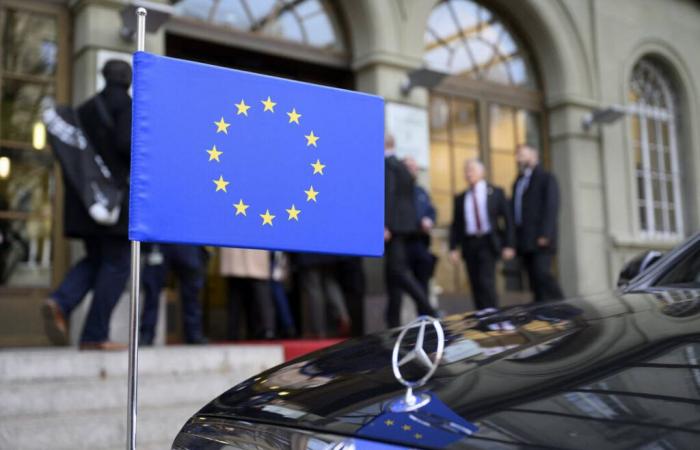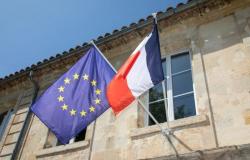Lack of leadership from the Federal Council, unnatural alliance of the SVP and the unions: the path towards the European agreement which will be put to the vote in three years is both narrow and steep. And yet, the stakes are considerable for Switzerland’s good relations with its largest economic partner.
The European issue may well be one of the major issues facing Switzerland in 2025, but for the moment it only arouses shrugs and rejection. The “historic” handshake between Viola Amherd and Ursula von der Leyen, on December 20 in Bern, was supposed to rekindle the European flame in the country, but Europe is definitely no longer a dream.
The successive political crises, in France, in Germany and now in Austria, with the surprise resignation of Chancellor Nehammer, undoubtedly influence the debate and it is above all the critical voices which are heard, in a sort of endless litany of grievances. Big finance circles do not see the point in linking up with Brussels, the unions are raising the stakes for wage protection and the UDC is surfing the crucial questions of “foreign judges” and the opening of borders. . “Europe has a hard time understanding us,” notes the NZZ in a somewhat fatalistic editorial. In short, things are stuck everywhere and the new president Karin Keller Sutter has one year to get the European file out of the rut.
Why is it still very important?
It should be remembered that the European Union represents nearly 50% of Swiss exports and 70% of imports. Suffice to say that the agreements concluded on December 20 are important. Where does this immense weariness come from at the mere mention of them? From an opposition that has barely changed for thirty years? Or the lack of leadership from the current Federal Council, as suggested in Time former Federal Councilor Ruth Dreifuss, whose words are as rare as they are influential. She says in particular:
“Our prosperity rests on these agreements. We have the same reasons for moving closer to Europe as in 1994. At the time, there was a strong commitment from the government. I haven’t heard much from the Federal Council today. This silence is embarrassing.”
This problem of political conduct is also noted by the daily Blick, for whom the situation is absurd. “The treaty concluded with Brussels is crucial for the future of Switzerland and yet we look in vain for its supporters. The presidents of the Center and the PLR are quietly sitting on the stands, watching the balls go by. The appearances of Minister Ignazio Cassis are moderately inspired”. In short, the entire Federal Council is being asked to give a decisive boost to the file in 2025.
The hot spots of the agreement
The text of the treaty is still secret and will only be published for consultation during the summer, before being transmitted to Parliament in 2026. The popular vote will take place in 2028, undoubtedly in several installments. Switzerland is therefore embarked on a campaign which will last several years, estimates the German-speaking daily in another article, with a few hot spots, starting with the price of access to the European internal market, with its 450 million consumers.
Swiss






